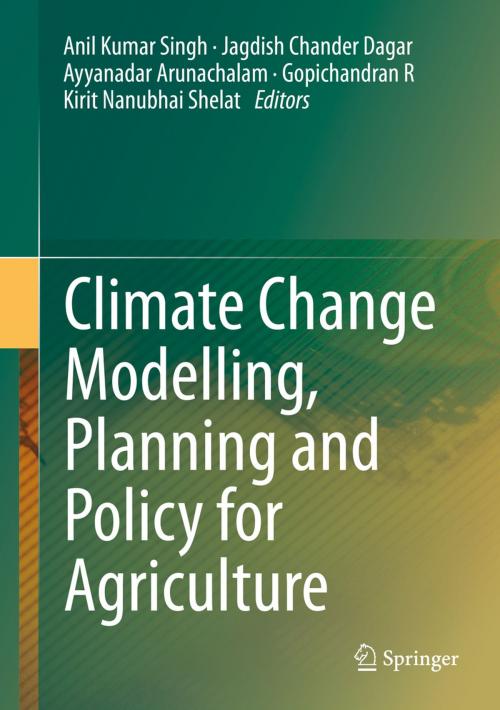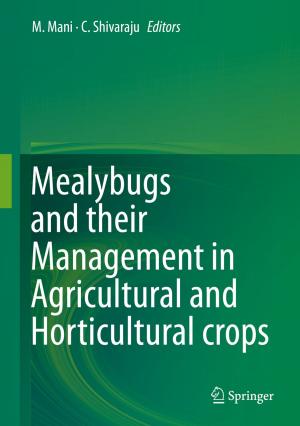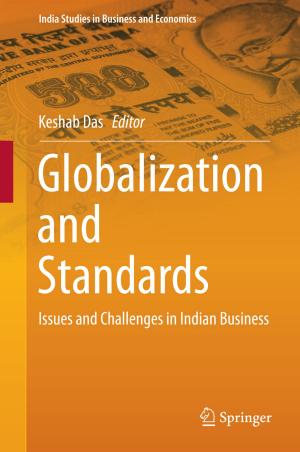Climate Change Modelling, Planning and Policy for Agriculture
Nonfiction, Science & Nature, Technology, Agriculture & Animal Husbandry, Science, Biological Sciences, Environmental Science, Nature| Author: | ISBN: | 9788132221579 | |
| Publisher: | Springer India | Publication: | March 16, 2015 |
| Imprint: | Springer | Language: | English |
| Author: | |
| ISBN: | 9788132221579 |
| Publisher: | Springer India |
| Publication: | March 16, 2015 |
| Imprint: | Springer |
| Language: | English |
It is well known that the impacts of climate change are tangible and hence there can be no debate about the need for appropriate adaptation measures, on a priority basis. However, it is equally important to recognize the fact that adaptation measures actually represent a dynamic synthesis of interventions pertaining to multiple systems. These are particularly of water, soil characteristics, genotypic and phenotypic variations and their expressions, age-correlated biochemical changes aligned with planting schedules and favorable weather/climate conditions. Nutrients, occurrence and distribution of associated vegetation including crop mixes also influence productivity. The overarching aspect of farming practice wields significant influence on the outcome and hence it is important to be clear about the particular focus of the investigations being carried out and reported in a suitable manner. It is essential to recognize that scientific research in agriculture in India has always produced valuable results of direct relevance to her people. Importantly, preparedness to tackle disasters due to inclement weather system has prominently featured on the agenda. The recent focus on climate change and impacts has provided the necessary impetus to reorganize the framework of investigation to capture the specifics of such impacts. In this context, the importance of micro climate variations too viz-a-viz the larger scales of impacts cannot be overemphasized. It will be useful to also help characterize natural variations versus artificially induced variations, helping us understand the complexities of individual and synergistic impacts too. Obviously, the limits and limitations of models could determine the spread and depth of the outcomes of investigations. Empirical evidences to reinforce assumptions have to also be documented with utmost care; guided by an understanding of the limits of tolerance, limiting factors, and the precautionary principle especially in the public policy interface. The present volume therefore, showcases these strands with the fond hope that they will stimulate further thinking and enable appropriate action.
It is well known that the impacts of climate change are tangible and hence there can be no debate about the need for appropriate adaptation measures, on a priority basis. However, it is equally important to recognize the fact that adaptation measures actually represent a dynamic synthesis of interventions pertaining to multiple systems. These are particularly of water, soil characteristics, genotypic and phenotypic variations and their expressions, age-correlated biochemical changes aligned with planting schedules and favorable weather/climate conditions. Nutrients, occurrence and distribution of associated vegetation including crop mixes also influence productivity. The overarching aspect of farming practice wields significant influence on the outcome and hence it is important to be clear about the particular focus of the investigations being carried out and reported in a suitable manner. It is essential to recognize that scientific research in agriculture in India has always produced valuable results of direct relevance to her people. Importantly, preparedness to tackle disasters due to inclement weather system has prominently featured on the agenda. The recent focus on climate change and impacts has provided the necessary impetus to reorganize the framework of investigation to capture the specifics of such impacts. In this context, the importance of micro climate variations too viz-a-viz the larger scales of impacts cannot be overemphasized. It will be useful to also help characterize natural variations versus artificially induced variations, helping us understand the complexities of individual and synergistic impacts too. Obviously, the limits and limitations of models could determine the spread and depth of the outcomes of investigations. Empirical evidences to reinforce assumptions have to also be documented with utmost care; guided by an understanding of the limits of tolerance, limiting factors, and the precautionary principle especially in the public policy interface. The present volume therefore, showcases these strands with the fond hope that they will stimulate further thinking and enable appropriate action.















